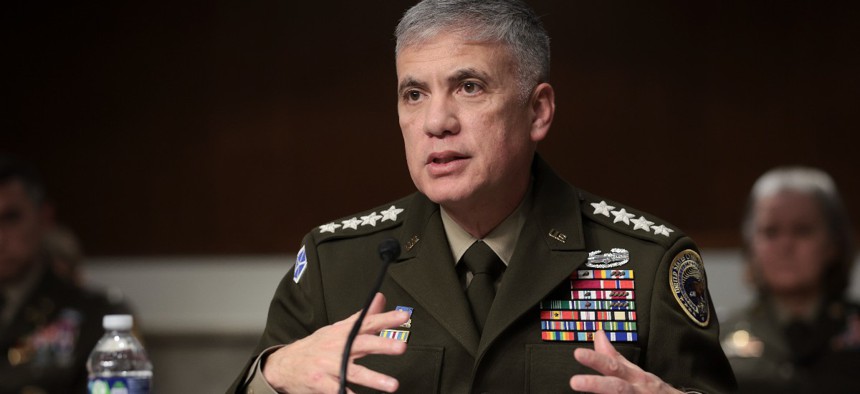NSA Chief: Cyber Command Did 9 International Missions Last Year

General Paul Nakasone, Commander United States Cyber Command and Director of the National Security Agency testifies before the Senate Armed Services Committee on April 5, 2022 in Washington, DC. Win McNamee/Getty Images
The dual-hatted head of the spy agency and military command has been conducting proactive missions to diffuse cyber threats to U.S. elections and other critical infrastructure and stressed the importance of artificial intelligence to advance those efforts.
The U.S. military conducted several missions in 2021 aimed at confronting cyber threats through what are known as “hunt forward” operations—where cyber defense specialists are deployed to assist allies in tracking down and exposing malicious activity in cyberspace.
Gen. Paul Nakasone says his office had a team in Ukrainian capital Kyiv since 2018, and that the California Army National Guard was there long before that. He said the Defense Department should be establishing similar partnerships and conducted nine operations around the world last year.
“In 2021, we conducted nine hunt forward operations utilizing US Cyber Command teams going to a series of different countries,” he said. “These are countries that have asked for our assistance, deploying our defensive teams for being able to identify malware and tradecraft our adversaries were using and then sharing that broadly with a commercial provider.”
Nakasone spoke Wednesday at a summit Vanderbilt University hosted on modern conflict and emerging threats.
The intelligence community was credited by Sen. Mark Warner, D-Va.,—chairman of the Intelligence Committee—and other lawmakers, during the recent annual hearings on worldwide threats, for flagging Putin’s potential invasion of its neighbor. NSA also contributed to a joint advisory the Cybersecurity and Infrastructure Security Agency issued on the nature of malware that was being used to attack Ukraine. Nakasone’s offices have also gotten recognition for other campaigns, such as one the general described as “dousing” Iranian attempts to influence election outcomes in 2020.
To address his agencies’ needs as the nature of conflict changes, Nakasone stressed the importance of strategic partnerships and pointed to a long standing relationship between Kyiv and the California Army National Guard. He said when his team touched down in the country in 2018, they were met by a leader from the Guard, which had been there since 1993.
Nakasone said his team told him of the California Guard group, “They knew every single person in the government and any help that you need with your hunt forward team they said they would offer.”
“These are the partnerships ladies and gentlemen,” Nakasone said, “that we need to be able to leverage today in the Department of Defense.”
He also highlighted the importance of being able to wield data in modern conflicts that demand speed and agility. “Big data, artificial intelligence and machine learning will push the boundaries of time and understanding for all of us,” he said.
In a hearing of the Senate Armed Services Committee Tuesday on the use of artificial intelligence in cyber operations, Joe Manchin, D-W.V., chairman of the committee's cybersecurity panel, joked about his lack of familiarity with the subject matter. He also used his opening statement to plug technology from Microsoft as a potential solution.
“Commercial cybersecurity companies have for a number of years been developing and applying AI technology to their products,” Manchin said. “And the Department of Defense is benefiting from that investment. Microsoft's Defender product is a good example. But direct DOD investment in cyber AI is lagging. I look forward to hearing recommendations from our witnesses on what we can be investing in and where we need to focus our intention.”






